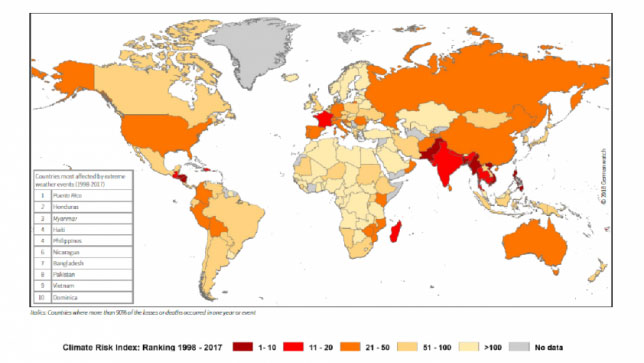Sri Lanka ranks 2nd in climate risk index
December 6, 2018 09:07 am
In a new global index, Sri Lanka has been ranked second among the countries most affected by extreme weather events in 2017.
The Long-Term Climate Risk Index listed Puerto Rico and Sri Lanka as the top two affected countries.
The index is part of a report, Global Climate Risk Index 2019, which was released at the annual climate summit in Poland’s Katowice city yesterday. The report was prepared analysing damages caused by the extreme weather events that took place from 1998 to 2017.
The Global Climate Risk Index 2019 analyses to what extent countries and regions have been affected by impacts of weather-related loss events (storms, floods, heat waves etc.) with the most recent data available — for 2017 and from 1998 to 2017 — taken into account.
The countries and territories affected most in 2017 were Puerto Rico, Sri Lanka as well as Dominica. For the period from 1998 to 2017 Puerto Rico, Honduras and Myanmar rank highest.

In May 2017, heavy landslides and floods occurred in Sri Lanka after strong monsoon rains in southwestern regions of the country. More than 200 people died after the worst rains on the Indian Ocean island since 2003.
The monsoons displaced more than 600 000 people from their homes and 12 districts were affected. The inland southwest district of Ratnapura was most affected where over 20 000 people faced flash floods.
According to the annual climate risk index for 2017, Bangladesh stood ninth among the countries most affected last year, Nepal was ranked fourth and India 14th in the list.
With four countries in the top of the list, the annual risk index shows that South Asian countries are among the most vulnerable globally to the impacts of climate change.
The global risk index says massive rainfall led to floods across Nepal, Bangladesh and India, which affected more than 40 million people. As many as 200 people lost their lives in these countries and millions were displaced throughout the region, Germanwatch said. The floods spread across the foothills of the Himalayas and brought landslides, destroying tens of thousands of houses, vast areas of farmland and roads.
According to the report, more than 526,000 people died worldwide and there were losses of $3.47 trillion as a result of more than 11,500 extreme weather events between 1998 and 2017.
Globally, 11,500 people died because of extreme weather events and economic damages totalled some $375 billion, it added.
Germanwatch in its long-term climate risk report says the poorer countries are the most affected as eight of the 10 countries most affected between 1998 and 2017 are developing economies.
The risk index was prepared by using the NatCatSERVICE database of the reinsurance company Munich Re and socioeconomic data of the International Monetary Fund.
It said there was increasing evidence on the link between El Niño events and global warming. The occurrence of El Niño, a warm current in the Pacific Ocean, affects the monsoon in South Asia, which is vital for the summer cropping season.
The occurrence of such events could double in the future due to climate change, the report said.

-With inputs from agencies












